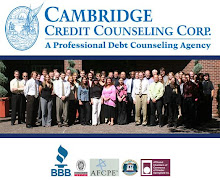by Thom Fox
Community Outreach Coordinator
Cambridge Credit Counseling Corp.
Instead of playing shuffleboard or golfing in Florida, many recent retirees are engaging in a more dangerous activity - entrepreneurship. An increasing number of seniors are opting out of the traditional retiree lifestyle to become players in the 21st-century economy, choosing instead to start businesses ranging from dry cleaners to sandwich shops. Experts are worried, however, that they’re often using portions of their retirement funds to get things up and running.
While these authorities recognize the importance of a healthy and fulfilling lifestyle, starting a business is notoriously risky. Statistics show that two-thirds of all new businesses fail within the first few years. When retirement funds are used as seed money, the risk may outweigh the anticipated return.
If you are in your golden years and want to contribute to the economy, you should seek guidance from as many business experts and community sources as you can before investing in a new business. It’s recommended that individuals set aside 80% of their annual income for each year of retirement. With our rising life expectancy, people naturally need to increase the amount of their retirement savings. Using the money it has taken decades to save is quite chancy.
How can you ensure that your investment is worth the risk?
Write a business plan: Writing a business plan is a good way to see if your idea is realistic, and it will force you to conduct valuable research. If you discover that the local market is over-saturated or that businesses similar to yours have failed, it can save you a tremendous amount of money.
Immerse yourself in your chosen industry: You’ll need to become an expert within the industry you’ve chosen. Join related industry or professional associations before you start your business to get the edge you need.
Get professional help: Talk to your local Small Business Association (SBA), a personal Financial Planner, your Tax-Accountant, basically anyone who can offer the support you need in your venture.
Seek alternative financing: Your idea may be attractive to other investors. Consider applying for an SBA loan or bank loan before tapping into your valuable retirement savings.
As with any aspect of personal finance, it’s best to be prepared for every outcome. Starting your own business can be rewarding, but you don’t want to jeopardize your retirement savings by investing beyond your capacity for loss.
Community Outreach Coordinator
Cambridge Credit Counseling Corp.
Instead of playing shuffleboard or golfing in Florida, many recent retirees are engaging in a more dangerous activity - entrepreneurship. An increasing number of seniors are opting out of the traditional retiree lifestyle to become players in the 21st-century economy, choosing instead to start businesses ranging from dry cleaners to sandwich shops. Experts are worried, however, that they’re often using portions of their retirement funds to get things up and running.
While these authorities recognize the importance of a healthy and fulfilling lifestyle, starting a business is notoriously risky. Statistics show that two-thirds of all new businesses fail within the first few years. When retirement funds are used as seed money, the risk may outweigh the anticipated return.
If you are in your golden years and want to contribute to the economy, you should seek guidance from as many business experts and community sources as you can before investing in a new business. It’s recommended that individuals set aside 80% of their annual income for each year of retirement. With our rising life expectancy, people naturally need to increase the amount of their retirement savings. Using the money it has taken decades to save is quite chancy.
How can you ensure that your investment is worth the risk?
Write a business plan: Writing a business plan is a good way to see if your idea is realistic, and it will force you to conduct valuable research. If you discover that the local market is over-saturated or that businesses similar to yours have failed, it can save you a tremendous amount of money.
Immerse yourself in your chosen industry: You’ll need to become an expert within the industry you’ve chosen. Join related industry or professional associations before you start your business to get the edge you need.
Get professional help: Talk to your local Small Business Association (SBA), a personal Financial Planner, your Tax-Accountant, basically anyone who can offer the support you need in your venture.
Seek alternative financing: Your idea may be attractive to other investors. Consider applying for an SBA loan or bank loan before tapping into your valuable retirement savings.
As with any aspect of personal finance, it’s best to be prepared for every outcome. Starting your own business can be rewarding, but you don’t want to jeopardize your retirement savings by investing beyond your capacity for loss.





No comments:
Post a Comment